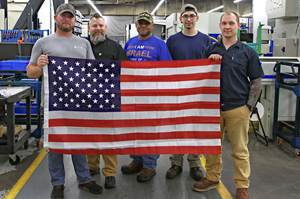Selling to a Key Employee without the Tax Fallout
An intentionally defective trust makes it possible for the employee to afford the purchase and for the seller to receive the full purchase price.
Share


ECi Software Solutions, Inc.
Featured Content
View More






Takumi USA
Featured Content
View MoreWhat is a business owner to do when he’s ready to retire but has no close relative to whom he can pass along the company? Identifying a key employee to take over the business is the logical solution, but what if that employee doesn’t have the money to buy it?
And what about the tax ramifications? The owner would like to see the value of his business show up in his personal bank account, free of income and capital gains taxes. Is this a possibility? Legally? The answer is yes, using an intentionally defective trust (IDT).
Here’s a typical scenario:
Joe (age 64) wants to sell his business (Success Co.) to a key employee (Cy), who actually already runs the company, but, as is often the case, doesn’t have enough money to fund the purchase.
Joe consults with his lawyer, Lenny, and tells him that he and Cy have agreed on a price of $5.7 million for the company, to be paid over 10 years, with 4 percent interest on the unpaid balance. The tax basis for Success Co.’s stock is about $500,000 (the company is an S corporation). Joe asks Lenny how the sale should be structured, and Lenny advises him to use an installment sale so that Joe will not have to pay taxes on the $5.2 million capital gain or the interest income until he actually gets paid by Cy.
Then Lenny explains the tax consequences of an installment sale: The top tax rate for ordinary income is 39.6 percent, which includes the interest income Joe will receive. Long-term capital gains taxes are at 20 percent. Basically, Joe would be clobbered with federal taxes, in addition to income taxes imposed by his state.
Additionally, Cy will be hit with both tax and economic problems. The impact of state and federal income taxes combined is 44 percent. So, for every $1 million that Cy needs to pay Joe, he actually must earn $1.78 million to cover $780,000 in taxes. So, to cover the purchase price of $5.7 million, Cy will need more than $10 million. And if he doesn’t pay it all at once, the unpaid balance is subject to taxable interest.
The economic impact of the sale makes a direct hit against the company. Cy’s personal financial statement will have to show a liability of $5.7 million, destroying his personal balance sheet and making it almost impossible for Success Co. to borrow money for growth, as banks require a personal guarantee from a company’s owner.
Using an IDT instead of an installment payment plan to facilitate the purchase of Success Co. solves these problems for both buyer and seller. It also enables Joe to maintain control of the company until he is paid in full. It’s a simple, two-step process:
Step 1 – Recapitalization (just a fancy name for creating voting and nonvoting stock). With, say, 100 shares of voting stock, Joe can maintain control of the company, while nonvoting stock will be transferred to Cy via the IDT.
Step 2 – Sale through the IDT. Joe creates the IDT and sells 10,000 shares of nonvoting stock to the trust for $5.7 million, which is paid in full with an interest-bearing note. The IDT now owns the nonvoting stock, and Joe has a $5.7 million note receivable. Future cash flow of Success Co. will be used to pay off the note and the interest.
Cy is the beneficiary of the IDT. When Joe’s note is paid off, the trustee will distribute the nonvoting stock to Cy. Then Cy will buy the 100 voting shares from Joe for a nominal price (say, $1,000). Cy now owns 100 percent of Success Co.
Unlike other irrevocable trusts, an IDT is not recognized for income tax purposes, so under the Internal Revenue Code, every penny the seller receives is tax-free: no capital gains tax on the note payments and no income tax on the interest income. Every $1 million of the purchase price for Success Co. saves about $195,000 in taxes. With a $5.7 million price tag, the savings in this case is about $1.11 million.
The IDT strategy also is a smart way to transfer a family business to the owner’s children. An IDT offers two more important advantages in such a case: 1) The fair market value of the nonvoting stock can be discounted by about 40 percent. For example, if Success Co. is worth $10 million, the nonvoting stock can be valued at about $6 million for tax purposes. 2) The trustee of the IDT can be instructed to keep the nonvoting stock in the trust so that in the event that one of the beneficiaries (the owner’s children) gets divorced, his/her spouse will have no interest in the stock.
Finally, an intentionally defective trust also can be used as a way for a stockholder to buy out fellow stockholders.
Related Content
Addressing the Manufacturing Labor Shortage Needs to Start Here
Student-run businesses focused on technical training for the trades are taking root across the U.S. Can we — should we — leverage their regional successes into a nationwide platform?
Read MoreThe Power of Practical Demonstrations and Projects
Practical work has served Bridgerland Technical College both in preparing its current students for manufacturing jobs and in appealing to new generations of potential machinists.
Read MoreFinding Skilled Labor Through Partnerships and Benefits
To combat the skilled labor shortage, this Top Shops honoree turned to partnerships and unique benefits to attract talented workers.
Read MoreHow I Made It: Amy Skrzypczak, CNC Machinist, Westminster Tool
At just 28 years old, Amy Skrzypczak is already logging her ninth year as a CNC machinist. While during high school Skrzypczak may not have guessed that she’d soon be running an electrical discharge machining (EDM) department, after attending her local community college she found a home among the “misfits” at Westminster Tool. Today, she oversees the company’s wire EDM operations and feels grateful to have avoided more well-worn career paths.
Read MoreRead Next
Building Out a Foundation for Student Machinists
Autodesk and Haas have teamed up to produce an introductory course for students that covers the basics of CAD, CAM and CNC while providing them with a portfolio part.
Read More5 Rules of Thumb for Buying CNC Machine Tools
Use these tips to carefully plan your machine tool purchases and to avoid regretting your decision later.
Read MoreRegistration Now Open for the Precision Machining Technology Show (PMTS) 2025
The precision machining industry’s premier event returns to Cleveland, OH, April 1-3.
Read More












































